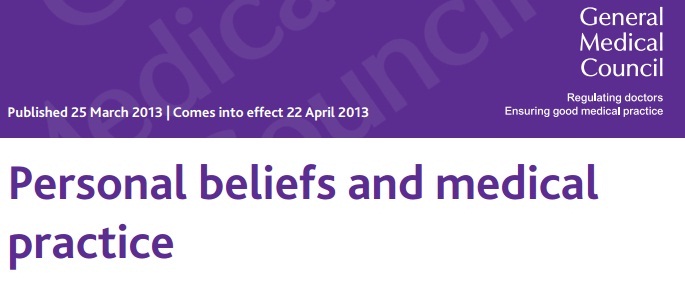Catholic Medical Quarterly Volume 63(3) August 2013
Faith in medicine
Conscientious Objection and Current Threats to Freedom of Conscience in the Workplace
A report of one of our Newcastle meetings by Dr Dermot Kearney
 The
June 2012 meeting of the Catholic Medical Association Newcastle
branch took place at Bede House, Windsor Terrace, Newcastle. The
topic discussed was “Conscientious Objection and Current Threats
to Freedom of Conscience in the Workplace”.
The
June 2012 meeting of the Catholic Medical Association Newcastle
branch took place at Bede House, Windsor Terrace, Newcastle. The
topic discussed was “Conscientious Objection and Current Threats
to Freedom of Conscience in the Workplace”.
For several years, attempts have been made to restrict and even totally remove the rights of doctors, nurses and pharmacists to opt out of participation in procedures or treatments to which they have a conscientious objection. The obvious area where many healthcare workers have ethical objections is that of abortion provision. It is generally believed that the Abortion Act of 1967 made abortion legal in the UK (except for Northern Ireland) but this is not actually true. Direct abortion remains illegal and a serious crime under earlier legislative Acts. The 1967 Act outlined the specific circumstances under which direct abortions could be carried out without incurring legal penalties. If the Act was properly enforced, the vast majority of the near 200,000 abortions carried out each year in the UK should be considered illegal.
Ironically, one of the main arguments used by those who wish to restrict the rights of conscientious objectors to abortion and other practices is that all healthcare workers should be obliged to provide whatever the law allows. It should be remembered, however, that laws can be unjust and do not always support what is true and virtuous. History provides many examples of unjust laws such as the Nuremburg Laws in Germany in the 1930s, the Apartheid Laws in South Africa and the Race Segregation Laws and Slavery Laws in the Americas. It has been suggested by writers such as Julian Savulescu (writing in the British Medical Journal in 2006) that conscientious objection is wrong and immoral and should be illegal. He argues that doctors who are not prepared to offer services that are legally permitted and “beneficial” to patients should not be doctors.
It is worth noting that the Abortion Act actually contains a vital clause recognising the right of healthcare professionals to conscientious objection. This right has come under attack with attempts in the UK Parliament and in Europe to overturn this protective provision. The attitude of the British Medical Association has not been helpful. While the right to conscientious objection provided within the Abortion Act is recognised, the BMA “recommends” that doctors have an “ethical duty” to refer patients to another colleague if they feel in conscience unable to provide a particular service that the “patient” requests. Similarly, the BMA suggests that some aspects of abortion provision such as referral of patients and clerking of patients seeking abortion are “incidental” to the actual procedure and that such actions should be considered to be outside the scope of the clause protecting conscientious objectors. This attitude is certainly contrary to that of the Catholic Church which teaches that any collaboration in the abortion process is gravely sinful.
It is not only doctors who are under pressure to participate in morally questionable activities. The General Pharmaceutical Union recently issued guidelines putting pressure on pharmacists to provide “emergency contraception” when asked to do so. If pharmacists have a conscientious objection to the “morning-after-pill” or other forms of contraception they are now expected to refer patients to another practice where they are sure to obtain such agents. Furthermore, in such situations the pharmacist is expected to actually make a phone call to the alternative provider to ensure that the specific drug or agent is actually readily available. These guidelines are placing many Catholic, Muslim and Jewish pharmacists and those of other faiths and none under tremendous strain to participate in activities to which they have serious moral and ethical objections.
Nurses are also under threat. Two Catholic midwives in Glasgow are currently engaged in a legal battle with their Healthcare Trust after they were subject to disciplinary action for refusing to supervise abortion provision in their hospital. The latest legal judgment was that they were sufficiently removed from direct involvement in the abortion procedure so that their personal beliefs were accommodated. Such bizarre judgments demonstrate extreme ignorance and lack of understanding of the true and wide-reaching consequences and responsibilities associated with religious belief.
It is not all bad news, however, for healthcare workers with
conscientious objection to cooperation with immoral practices.
In October 2011, an attempt by a British politician, Christine
McCafferty, was made at the influential Council of Europe to
restrict the right to conscientious objection by healthcare
workers in all European countries. The initial proposal aimed to
“regulate” such objections. In a remarkable debate, the case for
the need to maintain these rights was strongly advanced by the
Irish and Italian representatives at the Council. The vote was
turned in favour of not only maintaining, but actually
strengthening, the rights of healthcare workers throughout
Europe to conscientious objection.
At the time of the talk
the General Medical Council was reviewing its guidelines to
doctors on the question of Medical Practice and Personal
Beliefs. There were widespread concerns that there would be new
pressures placed on doctors to act in ways that challenge their
personal beliefs and religious convictions in the interest of
“effective patient care”.
These guidelines have now been produced and while there may be severe pressure to refer in some circumstances, the draft document was hugely improved after the consultation, which included robust feedback from the CMA and several of its members.

